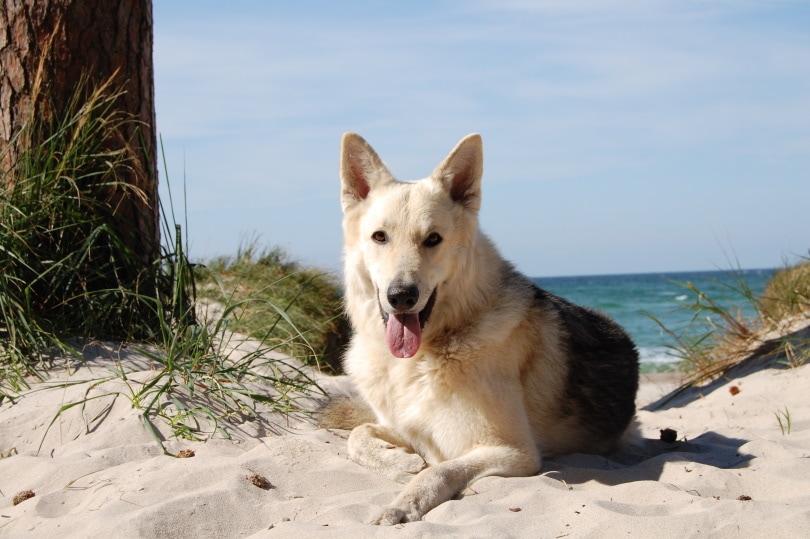Are Westies Hypoallergenic? Vet-Approved Facts & FAQ
By Beth Crane
Updated on

Westies, or West Highland White Terriers, are small white dogs that hail from Scotland and have distinctive white fur that gives them heaps of character. But are they hypoallergenic? The short answer is no, because no dog breed is hypoallergenic. While they are considered a low- to medium-shedding breed, that doesn’t mean they are hypoallergenic.
All dogs produce allergens to a greater or lesser extent, and these are not only carried on dog hair but are also found in dander (dead skin cells), urine, and saliva.
What Does Hypoallergenic Mean?
Hypoallergenic means that something doesn’t trigger allergic reactions. Certain dog breeds, such as Westies, Poodles, and Maltese, are described by some people as hypoallergenic, but that isn’t truly the case.
People who are allergic to dogs have an allergy to the proteins found in dog urine, saliva, and dander, which are mainly carried on hair. No dog is 100% hypoallergenic because all dogs produce these proteins. The allergens themselves are harmless; it is how the body reacts to them that causes the allergy symptoms. To date, there are seven canine allergens identified, the most studied ones being Can f1 and Can f2.
Furthermore, different dogs produce different numbers of allergens. Some dogs might be more “hypoallergenic” for some people, and others are less so. Also, some people may have an allergic reaction when a dog licks them, but most of the time, allergies are triggered by shed fur and dander. These can float in the air or settle on furniture, causing an allergic reaction before you even touch the dog.

Why Are Westies Considered Hypoallergenic?
Westies are seen as hypoallergenic because they don’t shed their fur very much. They have a dense and rough top coat with a smoother undercoat. Because of this, they don’t shed as much as some other breeds do.
Do All Westies Have a Similar Type of Coat?
Westies conform to a strict breed standard that requires them to have the coarse, white fur they’re well known for. Any deviation from the standard means that the dog is seen as not a “true” West Highland White Terrier. If you’re considering getting a puppy from a breeder or rescuing a Westie, be sure to ask questions surrounding the dog’s parents and whether or not they have any other breed mixes. If there are features in the dog from any other breed, they may shed more and be less hypoallergenic.
Because a true Westie should have a double coat and should shed very little, you could say that all Westies are hypoallergenic. How hypoallergenic they are to an individual, however, can vary. Shedding depends on genetics, climate and other environmental or dog health factors. There are also instances where individual dogs might produce more dander than others, and Westies, unfortunately, tend to suffer from dry skin and allergies of their own.
How hypoallergenic a Westie is to a specific individual can vary. Allergen production and shedding depends on genetics, climate, and other environmental or dog health factors.

What Can Affect How Hypoallergenic a Westie Is?
West Highland White Terriers are more prone than other breeds to suffer from allergies and skin conditions, which could mean you need to look after their skin and fur more often than with other dogs. For example, Westies are known to suffer from atopic dermatitis, which is an allergic reaction that causes dry, itching skin and inflammation. It is a genetic disease affecting many Westies over some or all of their bodies. Due to the dryness and itching the disease can cause, the potential for fur loss and extra dander production could worsen any allergic reaction.
As many as 25% of all Westies could be affected by atopic dermatitis, and it can be difficult to determine whether your puppy will suffer from it.
Are There Any Other Breeds Considered Hypoallergenic?
Many breeds are classed as “hypoallergenic” and available for people with dog allergies, but each dog will produce a different reaction. Some people allergic to Poodles (another so-called hypoallergenic breed) might be fine with a particular Westie and vice versa. The following dog breeds are considered low shedding:
- Poodles
- Poodle crosses (Labradoodle, Maltipoo, etc.)
- Maltese
- Bichon Frise
- Portuguese Water Dog
- Chinese Crested
- Airedale Terrier
Crosses of these breeds can also be low shedding, but it often depends on the coat they inherit from their parents. For example, a Labradoodle might inherit a wavy or straight coat from their Labrador parent, or they might inherit a curly coat from their Poodle parent.

Do Westies Shed?
Like all dogs, Westies do shed their fur. However, the shedding is generally kept to a minimum. Since a Westie’s coat is coarse and long, it needs to be groomed and clipped regularly. This can present a problem to owners who are allergic to dogs because they’ll likely come into contact with fur, dander, and saliva when they groom their dog. To reduce the dander circulating in your home, grooming should be done by a professional or at least, outdoors by a non-allergy sufferer.
Final Thoughts
Westies are often called hypoallergenic in unreliable sources because they have low-shedding, coarse fur, but this simply isn’t the case (no dog is hypoallergenic). Also, some Westies may have skin conditions that can cause them to shed more fur and dander, which can potentially increase the number of allergens they shed in the home.
How allergic a person is to dogs usually depends on the specific dog rather than a particular breed. So, even a person with allergy symptoms triggered by one Westie could get along fine living with a different Westie! Overall, it is best to speak to your doctor to determine the cause of your allergies so you can understand and manage them in the best possible way.
Featured Image Credit: Dora Zett, Shutterstock












